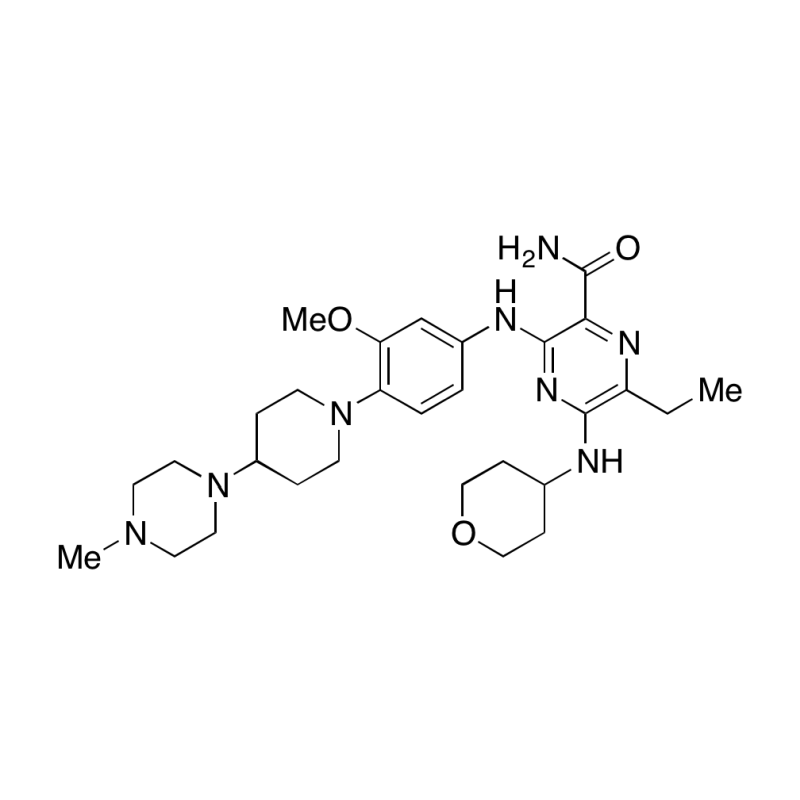产品
编 号:F096207
分子式:C29H44N8O3
分子量:552.71
分子式:C29H44N8O3
分子量:552.71
产品类型
规格
价格
是否有货
2mg
640
In-stock
5mg
800
In-stock
10mg
1200
In-stock
50mg
2800
In-stock
100mg
4120
In-stock
结构图

CAS No: 1254053-43-4
产品详情
生物活性:
Gilteritinib (ASP2215) is a potent and ATP-competitive FLT3/AXL inhibitor with IC50s of 0.29 nM/0.73 nM, respectively.
体内研究:
In MV4-11 xenografted-mice, the concentration of Gilteritinib (ASP2215) in tumors is more than 20-fold higher than that in plasma with oral administration of Gilteritinib at 10 mg/kg for 4 days. Treatment of Gilteritinib for 28 days results in dose-dependent inhibition of MV4-11 tumor growth and induces complete tumor regression at more than 6 mg/kg. Further, Gilteritinib decreases tumor burden in bone marrow and prolonged the survival of mice intravenously transplanted with MV4-11 cells.
体外研究:
Of the 78 tyrosine kinases tested, Gilteritinib (ASP2215) inhibits FLT3, leukocyte tyrosine kinase (LTK), anaplastic lymphoma kinase (ALK), and AXL kinases by over 50% at 1 nM with an IC50 value of 0.29 nM for FLT3, approximately 800-fold more potent than for c-KIT. Gilteritinib inhibits the activity of eight of the 78 tested kinases by over 50% at concentrations of either 1 nM (FLT3, LTK, ALK, and AXL) or 5 nM (TRKA, ROS, RET, and MER). The IC50s are 0.29 nM for FLT3 and 0.73 nM for AXL. Gilteritinib inhibits FLT3 at an IC50 that is approximately 800-fold more potent than the concentration required to inhibit c-KIT (230 nM). The antiproliferative activity of Gilteritinib is evaluated against MV4-11 and MOLM-13 cells, which endogenously express FLT3-ITD. After 5 days of treatment, Gilteritinib inhibits the growth of MV4-11 and MOLM-13 cells with mean IC50s of 0.92 nM (95% CI: 0.23-3.6 nM) and 2.9 nM (95% CI: 1.4-5.8 nM), respectively. Growth suppression of MV4-11 cells is accompanied by inhibition of FLT3 phosphorylation. Relative to vehicle control cells, phosphorylated FLT3 levels are 57%, 8%, and 1% after 2 h of treatment with 0.1 nM, 1 nM, and 10 nM Gilteritinib, respectively. In addition, doses as low as 0.1 nM or 1 nM result in the suppression of phosphorylated ERK, STAT5, and AKT, all of which are downstream targets of FLT3 activation. To investigate the effects of Gilteritinib on AXL inhibition, MV4-11 cells that expressed exogenous AXL are treated with Gilteritinib. At concentrations of 1 nM, 10 nM, and 100 nM for 4 h, Gilteritinib treatment decreases phosphorylated AXL levels by 38%, 29%, and 22%, respectively.
Gilteritinib (ASP2215) is a potent and ATP-competitive FLT3/AXL inhibitor with IC50s of 0.29 nM/0.73 nM, respectively.
体内研究:
In MV4-11 xenografted-mice, the concentration of Gilteritinib (ASP2215) in tumors is more than 20-fold higher than that in plasma with oral administration of Gilteritinib at 10 mg/kg for 4 days. Treatment of Gilteritinib for 28 days results in dose-dependent inhibition of MV4-11 tumor growth and induces complete tumor regression at more than 6 mg/kg. Further, Gilteritinib decreases tumor burden in bone marrow and prolonged the survival of mice intravenously transplanted with MV4-11 cells.
体外研究:
Of the 78 tyrosine kinases tested, Gilteritinib (ASP2215) inhibits FLT3, leukocyte tyrosine kinase (LTK), anaplastic lymphoma kinase (ALK), and AXL kinases by over 50% at 1 nM with an IC50 value of 0.29 nM for FLT3, approximately 800-fold more potent than for c-KIT. Gilteritinib inhibits the activity of eight of the 78 tested kinases by over 50% at concentrations of either 1 nM (FLT3, LTK, ALK, and AXL) or 5 nM (TRKA, ROS, RET, and MER). The IC50s are 0.29 nM for FLT3 and 0.73 nM for AXL. Gilteritinib inhibits FLT3 at an IC50 that is approximately 800-fold more potent than the concentration required to inhibit c-KIT (230 nM). The antiproliferative activity of Gilteritinib is evaluated against MV4-11 and MOLM-13 cells, which endogenously express FLT3-ITD. After 5 days of treatment, Gilteritinib inhibits the growth of MV4-11 and MOLM-13 cells with mean IC50s of 0.92 nM (95% CI: 0.23-3.6 nM) and 2.9 nM (95% CI: 1.4-5.8 nM), respectively. Growth suppression of MV4-11 cells is accompanied by inhibition of FLT3 phosphorylation. Relative to vehicle control cells, phosphorylated FLT3 levels are 57%, 8%, and 1% after 2 h of treatment with 0.1 nM, 1 nM, and 10 nM Gilteritinib, respectively. In addition, doses as low as 0.1 nM or 1 nM result in the suppression of phosphorylated ERK, STAT5, and AKT, all of which are downstream targets of FLT3 activation. To investigate the effects of Gilteritinib on AXL inhibition, MV4-11 cells that expressed exogenous AXL are treated with Gilteritinib. At concentrations of 1 nM, 10 nM, and 100 nM for 4 h, Gilteritinib treatment decreases phosphorylated AXL levels by 38%, 29%, and 22%, respectively.
产品资料

